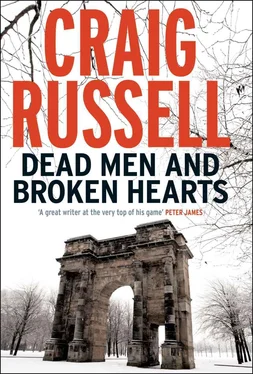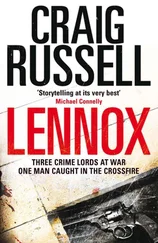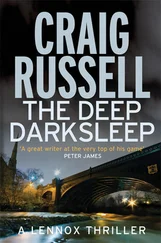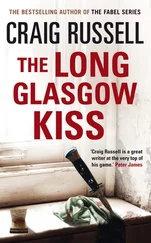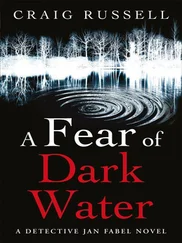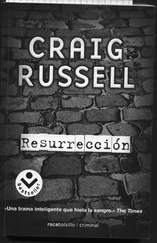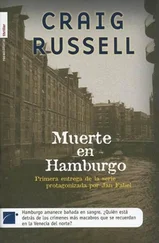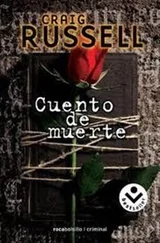Craig Russell - Dead men and broken hearts
Здесь есть возможность читать онлайн «Craig Russell - Dead men and broken hearts» весь текст электронной книги совершенно бесплатно (целиком полную версию без сокращений). В некоторых случаях можно слушать аудио, скачать через торрент в формате fb2 и присутствует краткое содержание. Жанр: Триллер, на английском языке. Описание произведения, (предисловие) а так же отзывы посетителей доступны на портале библиотеки ЛибКат.
- Название:Dead men and broken hearts
- Автор:
- Жанр:
- Год:неизвестен
- ISBN:нет данных
- Рейтинг книги:4 / 5. Голосов: 1
-
Избранное:Добавить в избранное
- Отзывы:
-
Ваша оценка:
- 80
- 1
- 2
- 3
- 4
- 5
Dead men and broken hearts: краткое содержание, описание и аннотация
Предлагаем к чтению аннотацию, описание, краткое содержание или предисловие (зависит от того, что написал сам автор книги «Dead men and broken hearts»). Если вы не нашли необходимую информацию о книге — напишите в комментариях, мы постараемся отыскать её.
Dead men and broken hearts — читать онлайн бесплатно полную книгу (весь текст) целиком
Ниже представлен текст книги, разбитый по страницам. Система сохранения места последней прочитанной страницы, позволяет с удобством читать онлайн бесплатно книгу «Dead men and broken hearts», без необходимости каждый раз заново искать на чём Вы остановились. Поставьте закладку, и сможете в любой момент перейти на страницу, на которой закончили чтение.
Интервал:
Закладка:
I realized that I could have confronted her there and then; that I could have demanded to know how she had managed to pay for the clothes, the shoes, the handbag, but there was something about what I had witnessed — its bizarre surreality — that made me want to watch her a little longer. My guess had been that this was all about a man and I decided to bide my time to see whom she met.
I had followed her on foot across Princes Street to a typically Edinburgh, typically snooty tearoom-cum-restaurant four floors up with a view of Edinburgh Castle. She ordered from a waitress who clearly knew her from previous visits and she sat contentedly eating scones, drinking tea and looking out across Princes Street Gardens to the castle. I knew then that there was no male companion, no secret tryst with a partner in crime or adultery. There was a peace and contentment about her that was fascinating and I knew I was watching her enjoy the single, complete, indivisible object of her larceny. This was what she had stolen for. It made absolutely no sense and it made absolutely perfect sense.
I followed her from the tearoom. She window-shopped, she browsed, she strolled, but didn’t buy anything. Then, after two hours, she returned to the railway station, picked up the suitcase and performed her transformation in reverse. We both caught the same train back to Glasgow but I made no effort to keep tabs on her; I had seen all I needed to see.
Like I said, it was the oddest thing about my job: to be able to look into the corners of people’s lives and see what they thought no one else could ever be party to.
The funny thing was that when it came to making my report to the store, I didn’t include the details of her trip to Edinburgh. I didn’t tell anyone about it. It wasn’t that I lied to my client: I gave a full account of the observation Archie and I had carried out and the fact that we had found no direct evidence of theft or even discrepancies in the till receipts. I don’t really know why I kept a secret for someone who didn’t know I was keeping it. Maybe it was because I could understand why someone would go to such great lengths to be, for a few hours once every month or so, someone completely different.
And now I found myself observing another life.
I followed the Daimler at as great a distance as I could risk without losing it in the dark and the rain. Andrew Ellis drove out of Bearsden, and towards the city centre through Maryhill. Maryhill was the kind of place you drove through. Without stopping if you had any sense. It was a tough neighbourhood where a squabble over a spilt pint of beer could cost you an eye, a lung or your life, yet run-down Maryhill sat shoulder-to-shoulder with prosperous Bearsden; opposite ends of the Glasgow social spectrum squeezed together. I dare say the city fathers had had it in mind to make the commute to work easier for burglars.
Ellis took a left off Maryhill Road and an alarm bell began to ring in my head. Not that there was anything wrong with his road skills, it was just that driving a Daimler into Maryhill was kind of like a Christian standing in the middle of the Colosseum and banging a dinner gong in the direction of the lions. I followed him in, not without trepidation. He took another left, then another, and a third that took him back out onto Maryhill Road. I let him take the last turn without following him, instead driving deeper into darkest Maryhill.
Now the alarm bells in my head were deafening. I had peeled off from his tail when he took the last left because his little manoeuvre had clearly been to check if the headlights in his rear-view mirror were there by coincidence or by design. It was a pretty fancy move for a run-of-the-mill Glasgow businessman to pull, even if he was on his way to see his piece of skirt on the side.
I pulled up at the kerb to give Ellis a few minutes before trying to catch sight of him again, although that was unlikely and probably unadvisable if he was on the lookout for a tail.
Mine was the only car in a grey-black tenement-lined street that had the picturesque charm of an abattoir yard. The gloom was punctuated every twenty yards or so by the insipid sodium glow of a streetlamp and I noticed, three standards down, a knot of youths in Teddy Boy gear gathered around the lamppost, smoking cigarettes with the expected dull indolence of adolescence. They turned their attention to the car, exchanged a few words and started to move in my direction. I decided now was maybe a good time to move on, in pretty much the same way as a wagon full of settlers in Cooke’s Canyon, on seeing Apaches silhouetted against the hilltops, would have decided it was a good time to move on.
Despite patriotic chest-beating to the contrary, British engineering was not, it had to be said, a wonderful thing. Why the design and construction of an even moderately reliable automobile lay beyond the nation that had come up with the Industrial Revolution was a puzzle that I found myself addressing, in slightly more colourful language, as my Atlantic stalled in the middle of the three-point turn, leaving me stranded and straddling the cobbled street.
I glanced, as casually as I could, towards the advancing Teddy Boys. Five of them. I could handle myself pretty well — a little too well, to be honest — but the arithmetic was against me. As I slipped the column shift into neutral, turned the key off then on again, and stabbed with my thumb at the starter button on the dash, an image flashed through my mind of my scalp adorning the mantelpiece of a Maryhill tenement while the residents whooped and pow-wow-danced around the coal scuttle.
The Atlantic wheezed rhythmically, threatened to cough into life, but spluttered to a stall. I repeated the procedure, aware that the gang of young thugs was almost at my door. This time the engine caught. I put the car into gear and gave it some gas. Time to go.
The engine died again.
There was a tapping on the window. A long face with small eyes and bad skin was leaned in towards the glass. He sported a Teddy quiff that clearly needed more grease to maintain than the average ten-axle freight locomotive. I was outnumbered, I had no sap or any other kind of weapon with me. I decided to play nice, for the moment. I rolled down my window.
‘Nice motor, pal…’ The Teddy Boy’s small eyes glittered hard as he spoke without removing the minuscule stub of a still glowing roll-up from his almost lipless mouth.
‘Thanks,’ I said.
‘Austin Atlantic A90, isn’t it?’
‘That’s right,’ I said. I noticed the others nodded approvingly at his superior knowledge.
‘Aye… that’s what I reckoned. I thought they was all for export to the Yanks.’
‘No… not all of them. I picked this one up in Glasgow. Second hand.’
‘You a Yank?’ he said, frowning at my accent in a way I didn’t like.
‘American? No. I’m Canadian.’
‘Canadian?’ He turned to his pals. ‘Hear that? He’s a Canadian…’ Then to me. ‘I got an uncle and cousins in Canada…’
‘Hasn’t everyone?’ I quipped. It was something that came up a lot when people found out I was a Canuck. Almost everyone in Glasgow had a relative who’d recently emigrated to Canada. Since the war, Glasgow had been haemorrhaging people and there were regularly round-the-block queues of hopeful would-be-immigrants outside the Canadian High Commission in Woodlands Terrace. As I smiled at my Teddy Boy chum and took in the grimy, wet gloom of a Maryhill street, I could understand the appeal of the Prairies.
The chief Ted leaned his head in through the window. It made him vulnerable and I considered making my move there and then. Taking him out would reduce the odds against me and, because he was clearly the leader, it might make the others less sure of themselves.
Читать дальшеИнтервал:
Закладка:
Похожие книги на «Dead men and broken hearts»
Представляем Вашему вниманию похожие книги на «Dead men and broken hearts» списком для выбора. Мы отобрали схожую по названию и смыслу литературу в надежде предоставить читателям больше вариантов отыскать новые, интересные, ещё непрочитанные произведения.
Обсуждение, отзывы о книге «Dead men and broken hearts» и просто собственные мнения читателей. Оставьте ваши комментарии, напишите, что Вы думаете о произведении, его смысле или главных героях. Укажите что конкретно понравилось, а что нет, и почему Вы так считаете.
